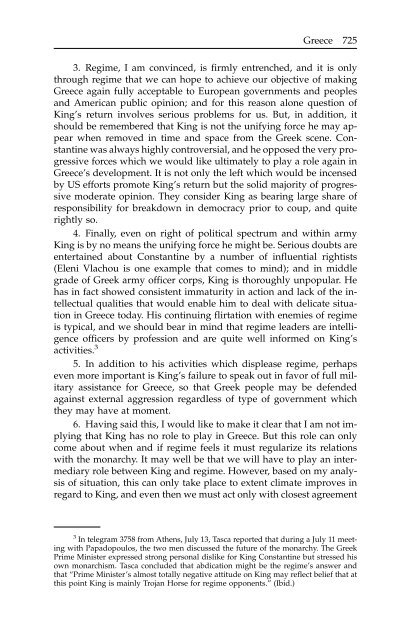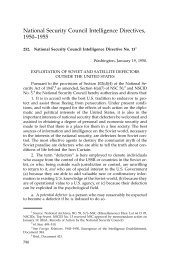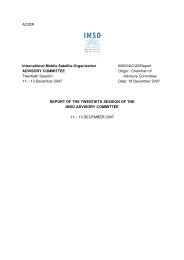Greece - US Department of State
Greece - US Department of State
Greece - US Department of State
Create successful ePaper yourself
Turn your PDF publications into a flip-book with our unique Google optimized e-Paper software.
<strong>Greece</strong> 725<br />
3. Regime, I am convinced, is firmly entrenched, and it is only<br />
through regime that we can hope to achieve our objective <strong>of</strong> making<br />
<strong>Greece</strong> again fully acceptable to European governments and peoples<br />
and American public opinion; and for this reason alone question <strong>of</strong><br />
King’s return involves serious problems for us. But, in addition, it<br />
should be remembered that King is not the unifying force he may appear<br />
when removed in time and space from the Greek scene. Constantine<br />
was always highly controversial, and he opposed the very progressive<br />
forces which we would like ultimately to play a role again in<br />
<strong>Greece</strong>’s development. It is not only the left which would be incensed<br />
by <strong>US</strong> efforts promote King’s return but the solid majority <strong>of</strong> progressive<br />
moderate opinion. They consider King as bearing large share <strong>of</strong><br />
responsibility for breakdown in democracy prior to coup, and quite<br />
rightly so.<br />
4. Finally, even on right <strong>of</strong> political spectrum and within army<br />
King is by no means the unifying force he might be. Serious doubts are<br />
entertained about Constantine by a number <strong>of</strong> influential rightists<br />
(Eleni Vlachou is one example that comes to mind); and in middle<br />
grade <strong>of</strong> Greek army <strong>of</strong>ficer corps, King is thoroughly unpopular. He<br />
has in fact showed consistent immaturity in action and lack <strong>of</strong> the intellectual<br />
qualities that would enable him to deal with delicate situation<br />
in <strong>Greece</strong> today. His continuing flirtation with enemies <strong>of</strong> regime<br />
is typical, and we should bear in mind that regime leaders are intelligence<br />
<strong>of</strong>ficers by pr<strong>of</strong>ession and are quite well informed on King’s<br />
activities. 3<br />
5. In addition to his activities which displease regime, perhaps<br />
even more important is King’s failure to speak out in favor <strong>of</strong> full military<br />
assistance for <strong>Greece</strong>, so that Greek people may be defended<br />
against external aggression regardless <strong>of</strong> type <strong>of</strong> government which<br />
they may have at moment.<br />
6. Having said this, I would like to make it clear that I am not implying<br />
that King has no role to play in <strong>Greece</strong>. But this role can only<br />
come about when and if regime feels it must regularize its relations<br />
with the monarchy. It may well be that we will have to play an intermediary<br />
role between King and regime. However, based on my analysis<br />
<strong>of</strong> situation, this can only take place to extent climate improves in<br />
regard to King, and even then we must act only with closest agreement<br />
3 In telegram 3758 from Athens, July 13, Tasca reported that during a July 11 meeting<br />
with Papadopoulos, the two men discussed the future <strong>of</strong> the monarchy. The Greek<br />
Prime Minister expressed strong personal dislike for King Constantine but stressed his<br />
own monarchism. Tasca concluded that abdication might be the regime’s answer and<br />
that “Prime Minister’s almost totally negative attitude on King may reflect belief that at<br />
this point King is mainly Trojan Horse for regime opponents.” (Ibid.)
















